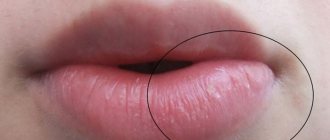- What does a swollen lip look like?
- Reasons for a swollen lip
- What measures to take when your lip is swollen? If your lip is swollen due to a bruise
- If your lip is swollen due to an infectious disease
- If the lip is swollen due to inflammatory processes
- If your lip is swollen due to herpes
- If the lip is swollen due to purulent processes in the oral cavity
- If your lip is swollen due to allergies
- If your lip is swollen due to external factors
- If your lip is swollen due to piercing, tattooing, or plastic surgery
- If your child's lip is swollen
Plump and sensitive lips are the dream of every girl and the external advantage of a young man. Such an external preference can prompt a person to use special cosmetics or even push for surgical intervention, but sometimes this feature develops contrary to our wishes. We are talking about sudden swelling of the lip, when the question naturally arises - what to do when the lip is swollen ?
| An excessively swollen lip is primarily an external defect that you want to get rid of. Moreover, only in rare cases does it occur for no reason; usually it occurs from certain health problems, which are no less important to eliminate. |
What does a swollen lip look like?
No matter how obvious the answer to this question may seem, lip swelling varies depending on the origin of the defect. Both lips can swell evenly; only one lip can be swollen - either the upper or the lower. The tumor itself can be concentrated evenly, in the center, asymmetrically on one side of the lip, only in the corner of the lips.
The only defect may be swelling and swelling of the lip; they can also develop against the background of suppuration, ulceration, and damage to the oral mucosa. A swollen lip is usually accompanied by hyperemia, that is, redness of the surface, pain or discomfort.
In addition, a swollen lip may be characterized by dryness and elasticity of the mucous membrane.
Reasons for a swollen lip
Solving the problem of a swollen lip must begin with identifying the cause of the defect. This can best be done (from a professional point of view) by a doctor - dentist, dermatologist, surgeon, traumatologist, therapist. Any of them, based on an examination and anamnesis data, will make a conclusion about the origin of the swelling, but the list of reasons for both the doctor and the layman is approximately the same, the only difference is in the right choice, which is often not possible without specialized education.
So, what can cause a swollen lip? This:
- infectious diseases - both in the oral cavity and in the body as a whole;
- inflammatory processes - both in the oral cavity and in the body as a whole;
- traumatic damage to the mucous membrane, including piercing;
- injury;
- carelessly performed dental procedures;
- allergic reaction;
- herpes.
Correctly determining the reason why the lip is swollen is the basis for taking adequate measures to respond to the problem and solving it as quickly as possible.
Possible complications
Most often, a swollen upper lip in a child, with timely and correct medical care, does not pose a danger to the health, much less the life of the child. In most cases, swelling goes away and leaves no negative consequences.
But it is worth noting that neglecting the baby’s condition or not following medical prescriptions can provoke the development of the following negative consequences:
- In most cases, swelling goes away and leaves no negative consequences.
Having a large scar.
- Eczema in an advanced stage.
- Development of sepsis.
- Life-threatening infection.
- The spread of herpes rash not only over the entire lip area, but also on the face.
- Rapid development of Quincke's edema during an allergic reaction.
- The appearance of a malignant neoplasm.
Important! To prevent the development of complications, treatment of lip swelling in a child must begin at an early stage.
What measures to take when your lip is swollen?
The most correct advice is to consult a specialist. No matter how superficial and insignificant such a problem as a suddenly swollen lip may seem, its origin can be very dangerous to health - this is the spread of infection in the body and frequent relapses, suppuration and ulceration of the damaged area, the attachment and spread of infectious flora, which only aggravates the course of the pathology .
If your lip is swollen due to a bruise
The most obvious and completely removable cause of lip swelling. It usually happens in a short time after injury and may be accompanied by damage to the integrity of the skin and mucous membranes. If timely treatment of the defect is not undertaken, it can be aggravated by inflammation, infectious damage, and suppuration.
Compresses must be applied to the injury site. Warm or hot. You can start with any choice, and if the first is ineffective, give preference to the second. A cold compress slows down blood flow to the injured area. For this, it is enough to wrap a few ice cubes in a cloth and apply it not so much to the lip and tumor itself, but to the skin nearby. A piece of cloth soaked in hot water can be an alternative, and again, not on the lip, but on the skin next to it, for 15-20 minutes.
If a wound has formed on the lip after a bruise, it is recommended to treat it with hydrogen peroxide and an agent that stops bleeding and promotes healing. It is recommended to use the antiseptics Miramistin or Chlorhexidine, healing ointments Actovegin and Solcoseryl. A “homemade” alternative to pharmaceuticals can be lanolin, olive or sea buckthorn oil.
However, please note that the skin on the lips is very thin and delicate, and deep wounds are difficult to heal. If the lip is so broken that the contour of the lips is lost, their shape changes significantly, rush to the doctor, otherwise healing may occur soon (at best), but the lips will lose their attractive appearance.
If your lip is swollen due to an infectious disease
The lip may become swollen due to a viral or bacterial infection. Moreover, the infection can be localized either directly in the oral cavity or on the lip (stomatitis, herpes), or throughout the body (ARVI).
In this case, antiseptic drugs will demonstrate effectiveness, the use of which is not recommended to delay. They quickly stop the infection and prevent it from spreading and getting worse. When purchasing a drug, it is important to familiarize yourself with the indications for its use and contraindications, which may result in side effects.
Popular antiseptics for the treatment of infectious diseases of the oral cavity are drugs such as Orasept, Chlorophyllipt, Bioparox. They have bactericidal, antiseptic, and analgesic effects. It is sprays and liquids that are easier to use on a swollen lip, rather than tablet or gel-like medications. It is advisable to moisten a cotton pad in the medicine and apply it to the damaged area of the lip.
If the lip is swollen due to inflammatory processes
The inflammatory process in a swollen lip is usually accompanied by the formation of a certain substance inside - it can be a clear liquid, pus, or any other discharge that is concentrated inside or released outside. This is usually accompanied by bad breath, pain, and often visible damage to the mucosa.
This poses a greater health hazard than it may seem. Since unprofessional removal of secretions is fraught with infection, and measures aimed at resolving the tumor do not always eliminate the true cause of inflammation, and subsequently it can appear again either in the area of the lips or in another area of the face.
It is important to establish the cause of the inflammatory process. Typically it is any of the following:
- swipe,
- cut or rupture of soft tissues,
- presence of an open wound,
- squeezing pimples.
In the first hours of the development of inflammation, it is necessary to respond with measures available to any average person - this is treating the damaged area with hydrogen peroxide. Another quick response measure could be treating the swelling with iodine solution (it is recommended to dilute it 1:1 with plain water). If you are already experiencing excessive dryness of the mucous membrane (and iodine dries out the treated area), it is enough to drink ordinary still water in small portions, the saturation of which will also moisturize the mucous membrane.
If you feel that you are not getting better, the pain and swelling are not decreasing, you should urgently contact a medical facility. Failure to contact a specialist in a timely manner can lead to the accumulation of pus in the lip, which requires surgical removal.
If your lip is swollen due to herpes
When your lip is swollen, you can suspect herpes only if it is a disease characteristic of the body. The formation of herpetic blisters on the lips is usually caused by swelling and soreness of the lips. Within 24 hours, such a swelling forms into a characteristic blister containing a translucent liquid inside.
Under no circumstances should you press or burst the resulting bubble, and the use of specific agents is most effective when starting at the tumor stage, which allows you to speed up the healing process. Popular antiherpetic drugs include Zovirax, Herpevir, Acyclovir. In their formula they contain components that exclusively destroy the manifestations of the herpes virus and have an analgesic and healing effect. They need to be applied regularly and systematically, not only until the main symptoms subside, but also until the blisters completely disappear and for another 1-2 days after that.
If the drugs of this group are powerless and within a few days the symptoms do not subside, but also worsen, the cause is probably not herpes, and therefore it is necessary to seek help from a specialist and not delay treatment that is adequate to the specific case.
If the lip is swollen due to purulent processes in the oral cavity
A swollen lip can be a symptom of stomatitis, gingivitis, periostitis (commonly called gumboil). This type of origin of swelling is perhaps the most dangerous, since purulent processes are certainly accompanied by inflammation, hyperthermia, deterioration in general health and is fraught with the spread of not only the infection, but also the pus containing it deep into the body.
Infectious and inflammatory diseases of the oral mucosa, jaw, periosteum can be caused by any traumatic lesion of the mucous membrane, improper treatment of dental diseases (including wearing braces, dentures, etc.), insufficient antiseptic treatment of the oral cavity during them or poor hygiene in general. Hypothermia, weakened immune system and stress are of secondary importance. If the reason for the appearance of a tumor lies precisely in diseases of the oral cavity, this does not mean that the danger is local in nature, inflammation can either occur from within the body or spread further, for example, through the bloodstream, which means that swelling on the lip can be eliminated without professional help, and the cause that caused it is unlikely to succeed. It is wise to consult your dentist for specific recommendations.
If your lip is swollen due to allergies
To come to this conclusion, it is necessary to analyze the list of recently consumed food products, cosmetics, household chemicals; perhaps the flowering season begins or an allergy develops to dust or animal dander.
It is typical that the lip is unlikely to become swollen due to inhalation of an allergen (which reduces the likelihood of dust and fur being involved in the swelling); the local action of the allergen is more likely, which means the use of cosmetics and food products, when the lips are easily exposed.
If the lip is truly swollen due to an allergic reaction, then the swelling will also be accompanied by slight numbness, redness, dryness and flaking of the lips.
If your lip is swollen due to external factors
These usually include frostbite or, conversely, overheating and chapping. Damage of this kind is characterized by excessive dryness of the lips, redness and peeling of their surface and, naturally, in the recent past the victim should recall the presence of a certain negative impact. Such an effect does not entail any particular danger, however, it would be useful to treat the lips with a moisturizing cream or cosmetic balm, or special restorative lip masks, which can be prepared at home.
If your lip is swollen due to piercing, tattooing, or plastic surgery
Performing piercings, tattoos in the lip area, or changing their shape through plastic surgery exposes a person to an increased risk of developing swelling and other unpleasant symptoms in the lip area. Swelling can develop either immediately after manipulation or after some time.
It is recommended to carefully examine the punctures or tattoos; it is better to entrust this to a cosmetologist or the person who did them. Thus, the likelihood of developing an inflammatory or purulent process in this area is excluded or confirmed. When piercing, it is very important to check the inside of the piercing and be sure that there are no foreign bodies in it. The jewelry itself can also fit into an extended puncture and cause discomfort and pain to the lip.
Persons with piercings, tattoos, or lip surgery still have the possibility of being exposed to the main risks listed above of the formation of a swelling on the lip.
If your child's lip is swollen
This situation is complicated primarily by the fact that the baby cannot always explain his feelings, describe the events of the last days that could lead to a tumor, especially when it comes to an infant.
During breastfeeding, babies may experience pain on the lips, and parents may notice swelling here due to improper feeding. Incorrect latching of the baby to the breast can cause the formation of calluses in the mouth, and therefore the baby’s discomfort during feeding should be a reason to reconsider the tactics.
It is necessary to take into account that children develop stomatitis more often than adults, and therefore the oral cavity must be examined and, having taken the first measures to treat stomatitis, still contact a pediatric dentist.
Children are more susceptible to allergic reactions than adults, their body is more sensitive to external irritants, children are more susceptible to respiratory viral and bacterial infectious attacks, and therefore, excluding self-medication, it is necessary to contact a specialist for specialized help.
Another reason for a swollen lip in a baby is a simple bruise. It must be dealt with in the same way as in an adult, with the exception of the use of certain pharmaceutical drugs that are not recommended for children.
Diagnostics
For help, you need to go, first of all, to the dentist. If, based on the results of the examination, he determines that he can cure the tumor, the patient will undergo an examination (usually referred for an x-ray).
In some cases, the tumor manifests itself due to problems within the bone tissue or other pathologies that the dentist cannot treat. Most often, the patient requires surgery. In such a situation, he will refer the patient to an oral and maxillofacial surgeon.
Note! Since the lip can become swollen due to unprofessional treatment (improper installation of a filling, periodontitis, etc.), you should only contact a qualified specialist.
Traditional medicine for swollen lips
Swelling on the lips is rarely expected; rather, it takes you by surprise. It’s good if your home medicine cabinet contains pharmaceuticals suitable for each specific case. The victim probably has the opportunity to go to both a doctor and a pharmacy. But what to do when your lip is swollen at night? It is advisable to react to damage as quickly as possible; you have to use improvised, “folk remedies”.
Traditional medicine suggests solving the problem of swollen lips as follows:
- aloe juice - finely chop or crush a large leaf of an adult aloe (over 3 years old) and squeeze out the juice, soak a cotton pad in the juice (or you can wrap the aloe pulp in gauze) and apply to the swelling for 15-20 minutes;
- a mixture of turmeric, Fuller's earth and water - the powders must be taken in equal quantities and diluted with a small amount of water to a paste-like state; apply to the swelling for 15-20 minutes, then rinse with warm running water;
- baking soda - form a paste-like substance from baking soda and a small amount of water and apply it to the damaged area of the lips; after 10 minutes, rinse with cold water;
- honey - apply a thick layer of honey onto a cotton pad, apply to the swollen area for 20 minutes, rinse with cold water; repeat several times a day.
Preventive measures
You can easily prevent the development of puffiness on your lips.
To do this, the following preventive measures must be observed:
- Consume exclusively clean foods.
- Keep your hands and mouth clean.
- Drink vitamin complexes systematically.
- During seasonal exacerbations, take antiviral drugs.
- Avoid trampling.
- Have regular dental checkups.
- Treat dental pathologies in a timely manner only from trusted specialists.
- For allergy sufferers, avoid contact with allergens and always carry antihistamines with you.
- Avoid psycho-emotional stress.
- Minimize stressful conditions.
Important! The main thing in preventing swelling of the upper lip in a child is its regularity. Only with this approach is it possible to avoid the appearance or recurrence of this condition.
Swelling of the lip in a child is not always an independent disease. In most cases, this is a clear sign of more serious pathologies. Therefore, if even the slightest swelling occurs, you must immediately consult a doctor.











